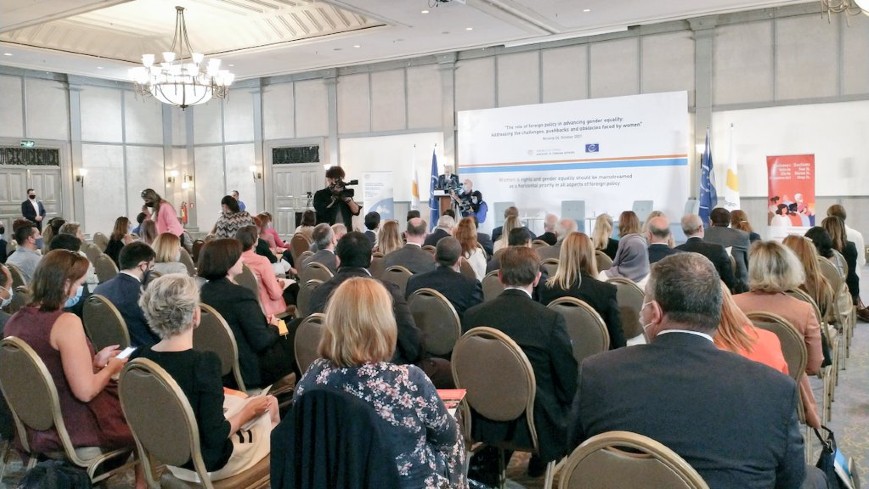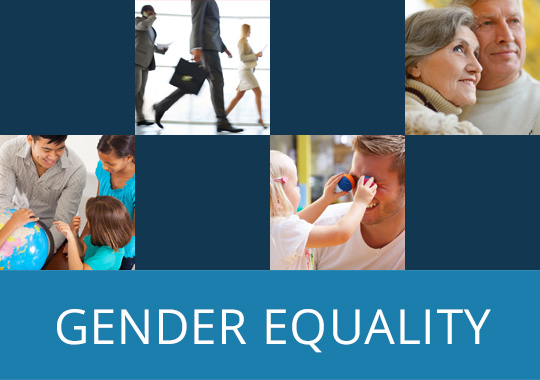The conference on ‘’The role of foreign policy in advancing gender equality: Addressing the challenges, pushbacks and obstacles faced by women” organised by the Ministry of Foreign Affairs of the Republic of Cyprus in partnership with the Council of Europe, took place on 26 October 2021 in Nicosia and online. In their opening remarks, the Minister of Foreign Affairs of the Republic of Cyprus, Nikos Christodoulides and the President of the House of Representatives of Cyprus, Annita Demetriou highlighted the significant efforts made by Cyprus in the promotion of women’s rights and gender equality, while acknowledging significant remaining challenges. This includes the fact that the COVID19 pandemic has unfortunately amplified the backlash against women’s rights and has served to further reveal persisting gender inequalities in all areas. Mr Christodoulides underlined that to “safeguard women`s right’s we need collective action (…), and therefore effective action needs also to be undertaken within the multilateral framework”. Ms Demetriou underlined the remaining low representation of women in decision-making (including in diplomacy), due to persistent stereotypes and bias, which confirms that “the glass ceiling is cracked but not broken”. Deputy Secretary General of the Council of Europe, Bjørn Berge, highlighted the achievements of the Council of Europe in advancing gender equality such as its Convention on Preventing and Combating Violence against Women and Domestic Violence (Istanbul Convention) and the Committee of Ministers’ Recommendation on preventing and combating sexism, stating that such tools represented “multilateralism at its best” in the interest of the 840 million European who live in Council of Europe member states.
In the first panel discussion, speakers highlighted the added value of multilateralism, which provides paths for robust actions to improve the lives of women and girls, but they also highlighted the need for a change of paradigm in order to avoid rolling back on progress achieved. In the second panel discussion, representatives from Cyprus, France, The Netherlands and Sweden spoke about their respective experience in developing a feminist or gender-sensitive foreign policy. They highlighted the impacts of these new policies, including more diverse voices and issues being represented, more focus on women’s empowerment, violence against women and issues related to sexual and reproductive rights, more projects and funding on these topics, triggering changes on the ground for women and girls around the world. They stressed the importance of women’s rights becoming a geopolitical issue to be addressed at the highest level. In the third session, speakers focused on the heightened vulnerable situation, in which migrant women and girls are, especially for example those who are undocumented or victims of trafficking for sexual exploitation. Speakers stressed the need for migration and asylum policies to be informed by the reality of women and with their full participation, which is still hampered by gender norms and discriminatory practices. Speakers also stressed that policies and situations, which have a negative impact on women also have a negative impact on families and communities. The knowledge gap in terms of data and research about the situation of migrant women and girls was also underlined as an ongoing challenge. In her conclusions, Claudia Luciani, Director of Human Dignity, Equality and Governance of the Council of Europe, highlighted the need for internal and external gender equality policies to mirror each other, the need to accelerate the pace of measures to address the backlash on women’s rights through enhanced gender mainstreaming and specific measures. Ms Luciani also mentioned the shrinking space for civil society action and the need to support in particular women’s organisations supporting the values of the Council of Europe. In the area of migration, she mentioned the current work on a draft Council of Europe Committee of Ministers Recommendation on migrant women and girls geared towards more gender-sensitive migration asylum and integration policies to better protect women’s human rights. She concluded by highlighting the importance of education both for women and on gender equality issues.





